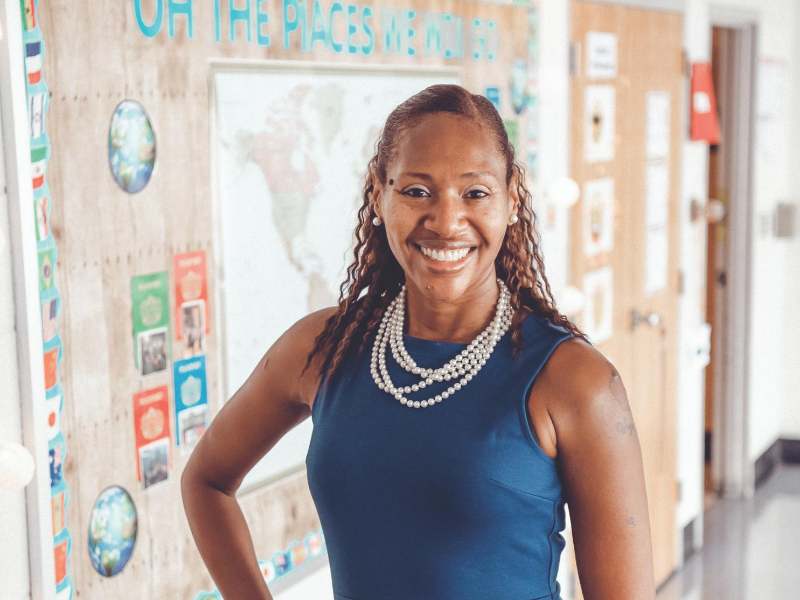
When you talk to Inge Chichester, who teaches world studies at Sligo Middle School in Silver Spring, you can’t help but think, “Darn! Now why didn’t I have a teacher like her?”
The 19-year veteran of Montgomery County Public Schools was named MCPS Teacher of the Year this spring, an honor due largely to her singular ability to connect with and advocate for students. At the same time, she’s a role model for colleagues and beloved of parents and school administrators—a balancing act worthy of the Flying Wallendas.
According to a press release from MCPS, Chichester “challenges teachers to be risk takers in the classroom and pushes them to offer lessons that are more than ‘good enough.’” A colleague noted that her warmth and commitment inspires students to achieve and earn her respect.
Chichester has always taught middle school and finds interaction with students at that stage of life especially rewarding. “I love middle school because it’s the middle child,” she says, explaining that it’s the time when student develops lifelong habits and when “character is invisible until it’s not.”
The Prince George’s County resident, who lives with her 15-year-old daughter, Michael-Michelle, will next compete for Maryland Teacher of the Year. I spoke to Chichester over FaceTime, and her passion for teaching could be sensed through the screen. So why did our conversation end with her in tears? Read on.
What drew you to teaching?
I was surrounded by educators. My grandmother worked for the D.C. public schools. I had two aunts who worked at Gallaudet. An uncle works in the Prince George’s public school system. As a kid I’d play “school” with my Barbie dolls and create lessons. Education has always been important to me, and I had a great experience with teachers, some of whom I’m still in touch with. It just seemed like the right path for me.
Where was your first teaching job?
At Hyattsville Middle School in PG in 1998, where I taught for three years. I heard Montgomery County was great for teacher training, and I was looking for diversity. I’ve been teaching in Montgomery since 2001.
As a new teacher, did anything take you by surprise?
I did not anticipate the level of support, of teamwork. I had a mentor teacher in the building and a consultant teacher outside. I was totally floored. As a student, I always saw a teacher alone. I didn’t realize it was a team of people coming together to make the magic we saw every day.
How have your interactions been with parents?
In our Sligo community, the level of support among parents is awesome. I haven’t asked for one thing that they haven’t said, “Sure.” Parents have given talks in my classes, including a museum curator who brought in artifacts. For our History Day competition, I reached out because I needed judges, and I had grandparents volunteer and some parents who didn’t even have kids in school.
You are known for using a bullhorn to recite some favorite sayings. Where did that come from?
The bullhorn is just a device to extend my reach beyond my own classroom. I’m able to connect with my students but I wanted to go further. The bullhorn lets them know that I’m here and I see you. Even kids I don’t really know will come up and ask, “What’s today’s saying?” And I might say, “It’s Talk it Out Tuesday.” That means I’m available to help them mediate their problems.
What would your students say is their favorite saying of yours?
Probably they would say, “Remember, Ms. Chichester loves you to life!” It’s so important for me to let the kids know that I love them, [that] I care for them through the lessons I prepare for them and that they have a voice.
You open your classroom to all students during lunch period. Why?
I open it up to one and all. Lately, they come and play the game UNO. It’s all about creating a safe space for kids; it’s so important to create an environment where you can nurture them.
Read more: Meet a mother-daughter duo who are working together to teach kids how to be kind.
How do you interpret discipline in the classroom?
Discipline is not a word I’ve used very much. It really is about setting expectations. In my classroom, we don’t have rules, we have agreements. The key is setting expectations and building strong personal relationships. In my classroom, we have six agreements that we review daily:
- You arrive on time
- Come prepared (homework, study, etc.)
- Read and follow directions
- One person speaks at a time
- Work during work times
- Raise your hand to speak
How do you handle bullying?
I’ve had some incidents, not a lot of them. The key is getting the kids to trust me so they know they can come to me. On Tuesdays we have a dialogue circle where we talk about things like this. And we establish a culture that this will not be tolerated here.
How do you balance your responsibilities to your students, their parents and the administration?
I’ve always put kids first. No parent or administrator has ever said to me, “That isn’t going to work.” It’s always been the needs of my kids. Although school was closed, I knew one of my students was having a birthday, so I called him at home to wish him happy birthday. That’s my balance.
If you could make one change in classroom teaching, what would it be?
I’d like to be able to expose my kids to more opportunities outside the classroom. I want them to be able to volunteer, serve our community, have that experience. After all, the work we’re doing in the classroom is preparing them for their work outside the classroom.
How much of the outside world should you bring into the classroom?
I want my kids to be global citizens. I want them to understand about public service. I take them on trips; we’ve been to Philadelphia, and thanks to donations, we were even able to go to Peru. At the same time, we talk about current events. After the death of George Floyd, we had a very reflective class. We just needed to process it.
In this time of heightened sensitivities and politically correct behavior and speech, what guidelines do you follow?
If you’re not having the so-called hard conversations on issues with the kids, you are not preparing them adequately. In my classes, the kids know that everyone gets heard and everyone gets listened to. Our kids are a lot more empathetic than we give them credit for.
What would you tell a young person who wants to be an educator?
You have to care about your students. If you don’t care about the students and their families, this isn’t the profession for you. If you’re just going to spew out the content every day, this isn’t for you. If you want to nurture kids to be the best they can be, then be a teacher.
Are teachers fairly compensated?
If you get into this business you’re not getting in it for the money. The best compensation for me is when a former student calls me and says, “I just want you to know that I’m now teaching elementary school at…” Three of my former students are MCPS teachers.
What’s the nicest thing your students have ever done for you?
Don’t do that … you’re going to make me cry. [Note: This is when she cries.]. I had a student who’s an amazing football player and plays on a club team out of school. His team went to a championship tournament in Florida. When he returned to school, he came to me and said, “I want you to have the trophy they gave me as MVP.” It took me totally by surprise. I have it on my desk. So as far as compensation goes, they can keep the money! How many people can say they got a reward like that?
A version of this story appears in the August-September 2020 issue of Montgomery Magazine.




